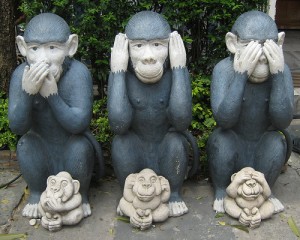Liar, Liar, Fur on Fire
A conservative estimate states that people lie at least once a day (Saad, 2011) but the truth is this number may very well be a lie. However, are humans the only species in the animal kingdom that are capable of deceptive behaviour? Apparently not. Many primates, especially the common chimpanzee (Pan troglodytes), display the ability to intentionally engage in deceptive behaviour in order to attain competitive advantages.
Deception is defined as “the projection, to one’s advantage, of an inaccurate or false image of knowledge, intentions, or motivations” (De Waal, 1992). A large pool of evidence has been accumulated which details the use of deception by nonhuman primates. Such acts range from the simple (in the example of a chimpanzee purposely leading its troop away from a hidden food stash so that it may have all the food to itself) to the relatively complex (a subordinate chimpanzee exploiting the fear of darkness of a superior chimpanzee in order to stop its bullying behaviour).
All these behaviours share the common attribute of providing a benefit to the agent committing deception; Benefits that enhance the survivability of the agents. A primate may deceive others into thinking it is harmless before lunging in for a surprise attack, thus, ensuring it’s success in physical competition, or may even fake an alarm call in order to scare other conspecifics away from a food source (as seen here [tehinfidel, 2009]), thus, ensuring higher success in feeding.
Humans are not spared in the lies contrived by primates. The infamous case of Koko the gorilla blaming a kitten for damaging its den (Bundrant, 2013) is a stark indication that primates do not discriminate in terms of the species they lie to. With such similarities in behaviour and genetic make-up, it is little surprise that we believe that primates are our closest relative in the animal kingdom and just with any familial relationships, lies and deceit are oft to be aplenty.
References:
Bundrant, M. (19 January, 2013). Gorilla destroys property, blames the cat. Are all primates liars? Retrieved 31 March, 2013, from Natural News.com: http://www.naturalnews.com/038743_primates_liars_gorilla.html
De omnibus dubitandum est. [tehinfidel]. (2009, May 4) Monkey lying: Capuchins sounding false alarms. Retrieved March 31, 2013, from http://www.youtube.com/watch?v=3aGj-Y0shIs
De Waal, F. B. (1992). Intentional deception in primates. Evolutionary Anthropology: Issues, News, and Reviews, pp. 86-92.
Saad, G. (30 November, 2011). How Often Do People Lie in Their Daily Lives? Retrieved 3 April, 2013, from Psychology Today: http://www.psychologytoday.com/blog/homo-consumericus/201111/how-often-do-people-lie-in-their-daily-lives
